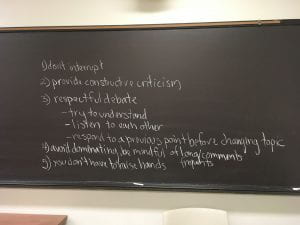 It’s no secret that remote and hybrid teaching presents unique challenges, but UChicago instructors are up to the task, developing creative solutions and adjusting their teaching style to best fit the virtual environment. The Humanities Division is delighted to spotlight its instructors’ approaches to these challenges, and celebrate their successes and innovations. This week, we sat down with Orit Bashkin, Professor of Modern Middle Eastern History, to discuss her experience teaching a graduate seminar remotely.
It’s no secret that remote and hybrid teaching presents unique challenges, but UChicago instructors are up to the task, developing creative solutions and adjusting their teaching style to best fit the virtual environment. The Humanities Division is delighted to spotlight its instructors’ approaches to these challenges, and celebrate their successes and innovations. This week, we sat down with Orit Bashkin, Professor of Modern Middle Eastern History, to discuss her experience teaching a graduate seminar remotely.
This spring, Professor Bashkin taught Nations in Crisis, Nations in Diaspora, a graduate class comparing “the histories of both Iraq and Palestine to explore questions relating to colonialism, nationalism and resistance in the modern Middle East.” She has taught similar seminars before in her 16 years at UChicago – three hours, 18-20 students, and a heavy reading load. But revamping the syllabus to adjust to the virtual environment was a daunting task. Orit’s main focus was avoiding Zoom fatigue, and generally decreasing the amount of time students spend looking at a screen when possible.
The structure of the course involved asynchronous lectures to give context and present interventions for the weekly readings and other source material. Orit introduced formats she hasn’t used before, and particularly enjoyed assigning podcasts for students to listen to each week. She had no trouble finding plenty of podcasts for each topic, and was happy to give out-of-class work that didn’t necessitate screen time for students. Orit then used the scheduled three hours of class time to meet with students over Zoom in groups of four of five for 30 minutes each. She acknowledged that although this was more work for her, and to some extent the larger collective atmosphere was missed, it allowed discussions to be more intimate. Professor Bashkin also fostered direct communication by adding small weekly assignments, and responded to students’ submissions directly over e-mail instead of on Canvas. Both the adaptation to small groups for synchronous discussion and the short assignments each week reflect the data about successful online teaching methods from the Spring 2020 Humanities Division Faculty and Graduate Student Surveys, and are suggested by the Division to instructors for their effectiveness.
Despite being a self-described technophobe, Orit was pleased with how the course progressed. At first, new challenges like navigating Panopto were intimidating, but gradually got easier. Most hurdles she faced ultimately worked out, especially since she didn’t shy away from asking for help and confirmation from the students. The opportunity to teach remotely introduced Professor Bashkin to approaches that she intends to replicate in the future, even in face-to-face classes, like the incorporation of podcasts. In an undergraduate class she taught, she also enjoyed shifting writing assignments from argumentative essays to a more creative lens, such as prompts to write a diary entry or article from the perspective of a historical figure. Orit enthused about integrating popular culture into source material with videos, music, commercials, news reels, cartoons, and musicals from the era.
Professor Bashkin is proud that the course engaged the students at a high level in a thoughtful and creative manner, and there are a couple main takeaways from her experience when it comes to teaching graduate courses in the virtual format. First, she felt encouraged by the success of using modes beyond the book and article, and affirms that there are lots of options available to instructors looking to branch out, especially in the Humanities. Films, podcasts, creative writing, or even just novels and autobiographies are great places to start. Secondly, Orit feels it is necessary to be flexible and to accept the particularities of teaching in our present moment. “The assumption that whatever you do face-to-face can happen virtually is not realistic,” she said, adding that it’s okay to let some things go in favor of more suitable approaches for the format. It’s also necessary to appreciate the situation that students are in. Orit had one student in her class who was experiencing a housing crisis, and one who had lost a family member. All were tired, stressed, exposed to Zoom all day, and reckoning with protests and the election cycle.
“It’s not just remote teaching,” Professor Bashkin said, “it’s the whole atmosphere that they’re living in. They didn’t know whether to leave their homes or not leave their homes. Some of them who got sick couldn’t get tested. Just remember that there’s a lot going on in their lives. It informs how the teaching is conducted. Pay attention to the situation and the context, and remember that they have things going on outside of the computer.”


